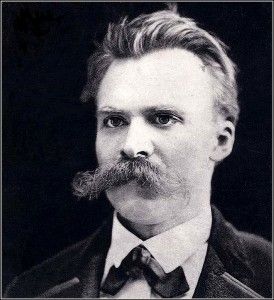Thursday

I've long been fascinated by Nietzsche, in the sense that I've always found him wildly wrong and wildly right, wildly reckless and wildly insightful. That being said, he's enough of a nut that I've taken the time to read only one of his books (and I can't recall which) and various excerpts from my Viking Portable Nietzsche. An extensive reading in Nietzsche is on my intellectual bucket list, but alas, that list is so long, it's more of an intellectual idiot list. Most of my knowledge of Nietzsche comes through the lens of real scholars, mostly de Lubac and his (excellent) Drama of Atheist Humanism.
I've long felt a bit guilty that I'm drawn to Nietzsche's ideas. It turns out I'm not alone. In this piece, Bradley Birzer also identifies Nietzsche as one of his "guilty pleasures." He then, in the form of a primer, goes on to explain three of Nietzsche's most important ideas:
1. "All modern drama in western civilization stemmed from the conflict found in the mythology of Apollo (order) and Dionysius (chaos)."
2. "Nietzsche considered Catholicism to be the greatest enemy yet invented and imposed upon the nobility of man. Its most important representative, he feared, was Pascal. . . . Catholicism, he believed, represented the only true Christianity. Lutheranism and Protestantism were merely halfway houses between Catholicism and full-blown paganism."
3. "Nietzsche himself believed that his ideas had taken him, mystically, into another universe or plane of existence, confirmed later, at least as he believed it, by a vision of Zarathustra, a pre-Christian Persian priest and prophet, within and next to him. Henri de Lubac has done the best job of exploring this side of Nietzsche in his Drama of Atheist Humanism. And though he despised Catholicism, Nietzsche even believed his collected writings to be a fifth Gospel, obviating those of Sts. Matthew, Mark, Luke, and John."
I don't know enough about Nietzsche to form an opinion about whether Birzer's primer is right or wrong, but it looks accurate enough. And I trust the good professor in such matters.
